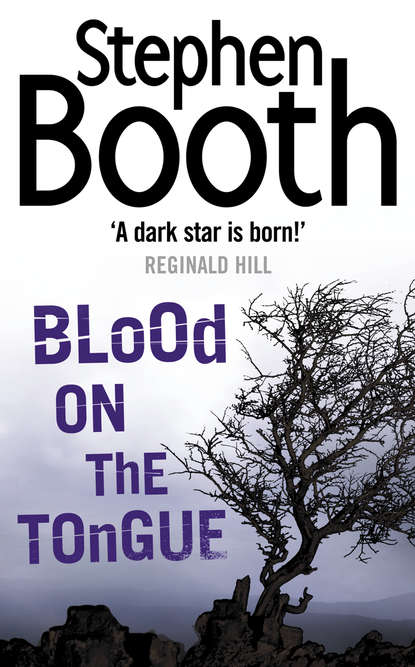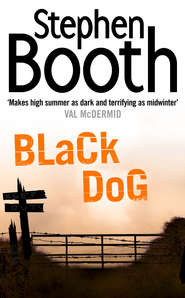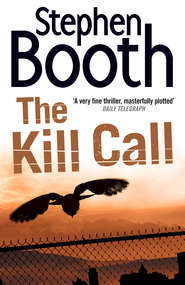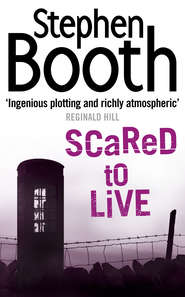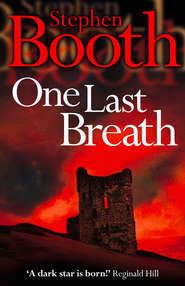По всем вопросам обращайтесь на: info@litportal.ru
(©) 2003-2024.
✖
Blood on the Tongue
Автор
Год написания книги
2019
Настройки чтения
Размер шрифта
Высота строк
Поля
5 (#ulink_005bcb2a-6403-5987-911d-25aa47e4b803)
By the next day, the skies had cleared. Overnight frost had sprayed glitter on the snow that lay on the moors, and the air crackled like static electricity.
Ben Cooper sighed as he stumbled around his room, determined not to miss breakfast today. First thing this morning he had to attend the Chief Superintendent’s meeting with the Canadian woman. He hoped it was something that could be got out of the way as soon as possible. It was an irrelevance, and a waste of time. From what he had read of the files produced by the Local Intelligence Officer, it was more than a cold case she was asking Derbyshire Constabulary to take up – it was no case at all.
Cooper was sure it was just another fuss being kicked up by somebody with an obsession about the past and the history of their family. The Canadian would be sent packing by Chief Superintendent Jepson pretty quickly.
She was unimportant, anyway. At the moment, until he was fully awake, Cooper couldn’t even remember the woman’s name.
Alison Morrissey had brought Frank Baine with her to West Street for support. Baine described himself as a freelance journalist who had researched local RAF history and the background to the aircraft wrecks that littered the Peak District. He hinted at a book yet to appear. He was also the man who had liaised for weeks now on behalf of the Canadian, pestering for information and a confirmed date and time for the meeting. Though the Chief Superintendent had at no stage spoken to Baine himself, he had already managed to become irritated by his persistence, communicated to him by his staff. That Canadian Consul must really be a valuable contact.
The four of them met in the Chief Superintendent’s office amid a flurry of cappuccino served by the Chief’s secretary, and an offer of the Bakewell tarts that Jepson kept for the purpose of demonstrating his Derbyshire street cred to visitors. Cooper couldn’t remember when he had tasted real coffee at West Street before. He had heard they actually served it to customers in reception at the new B Division headquarters, but he wouldn’t believe it until he saw it for himself.
The meeting opened with some half-hearted pleasantries about the health and welfare of Miss Morrissey’s uncle, his family, his dog and his golf handicap. The Chief Superintendent eventually ran out of small talk and sat looking at his visitors in silence. It was an interrogation technique that he fell back on from force of habit, from his long-past days in the CID. It worked, though. Alison Morrissey began talking almost immediately.
‘As you know, gentlemen, I asked for this meeting because I am attempting to clear the dishonour on the name of my grandfather, Daniel McTeague, who was an officer serving in the Royal Canadian Air Force. He was reported missing while on attachment to the RAF in January 1945.’
‘All of fifty-seven years ago,’ said Chief Superintendent Jepson. He was smiling amicably, but he was putting down his marker from the start.
‘I happen to know that your neighbours the Greater Manchester Police re-opened a case last year that was exactly fifty-seven years old,’ said Morrissey, looking him straight in the eye. ‘The length of time that has passed seems to me to be irrelevant, if there’s been a miscarriage of justice.’
Cooper sneaked a look at her over the files he was pretending to study. He hadn’t expected her to be so young. If he had bothered to think about it, he would have been able to work out her possible age range, of course, since he knew it was her grandfather that she was here to talk about. It was mentioned in the files that Pilot Officer McTeague had been twenty-three when he went missing. His daughter, Alison Morrissey’s mother, had been born only days before he disappeared, which would make her fifty-seven now. She must have been one of those women who waited until her thirties before having children, because Morrissey could barely have been more than twenty-five or twenty-six. Cooper liked the way she had answered the Chief Superintendent. She had plenty of determination. And she knew her stuff, too.
‘There was never a court case,’ pointed out Jepson. ‘Justice was not involved.’
‘Natural justice,’ said Morrissey.
The Chief Superintendent sighed a little. ‘Go on.’
‘My grandfather was the pilot of a Lancaster bomber based at RAF Leadenhall in Nottinghamshire, part of 223 Squadron of Bomber Command. He had been flying with the RAF for two years, and he had an excellent service record. He was awarded a Distinguished Flying Cross after bringing home a damaged Wellington from a successful raid on German U-boat bases near Rotterdam. He ordered his crew to bail out once they were over England and landed the aircraft single-handedly. And that was despite the fact that he had himself been wounded by shrapnel from enemy anti-aircraft fire. As soon as he recovered from his injuries, he retrained on Lancasters and was posted to RAF Leadenhall.’
‘Very interesting,’ said Jepson. ‘But can we move forward to January 1945?’
‘You need to know what sort of a man my grandfather was,’ said Morrissey.
Cooper watched her eyes harden with a momentary anger as she spoke. Her age might have taken him by surprise, but he certainly hadn’t expected her to be so attractive. She had that style and confidence that made a woman stand out from the crowd. He was enjoying her display of assurance and pride. He was surprised that Jepson hadn’t softened to her more by now – he usually had a weakness for an attractive young woman himself. But the Chief must have hardened his heart, and once he did that, there was no way he would back down. This meeting could have only one possible outcome. Cooper was already beginning to feel sympathy for the Canadian woman. Jepson would let her go through her paces, but in the end, she was going to be disappointed.
‘This is a photograph of my grandfather,’ said Morrissey. She slid a picture across the table to the Chief Superintendent, then one to Ben Cooper. She had hardly looked at him so far, except for a quick glance of appraisal when they had been introduced. He had the impression that she was a woman who knew exactly what she aimed to achieve, and who was most likely to be able to help her. Now, she fixed her gaze on Chief Superintendent Jepson again.
‘That photograph was taken when he was promoted to the rank of Pilot Officer on joining 223 Squadron,’ she said. ‘Because of his service, he was a year or two older than most of his crew. That’s why they called him “Granddad”.’
The photo was something that the LIO hadn’t been able to produce for the files. Yet surely it must have been readily available, if it was an official RAF shot. Morrissey had been better organized, or had better help. Cooper glanced at Frank Baine. He had heard of Baine vaguely. He recollected having seen a television programme the journalist had featured in, which had been commemorating the sixtieth anniversary of the Battle of Britain. The only thing Cooper remembered clearly from the programme was the fact that some of the Lancaster bombers used by the RAF during the Second World War had been built at a factory in Bamford, only a few miles from Edendale. Of course, the factory was long since gone, as were all the Lancasters it had produced. A woman who appeared on the programme had spoken of working on the aircraft as a girl, and of being told by an officious foreman in a bowler hat that if she made any mistakes she would be responsible for allowing the Germans to win the war.
‘I want you to look at the photograph,’ said Morrissey, ‘because you will be able to see how proud my grandfather was of his uniform.’
Pilot Officer McTeague was immaculate in his RAF uniform, with his peaked cap, brand new hoops on his sleeve, and a medal on a ribbon pinned to his breast pocket. He stood almost to attention, with his arms at his sides. His tie was perfectly straight, and there were sharp creases in his trouser legs. The uniform would have been blue, of course, though the photo was black and white. Probably the original print had been sepia – this looked like a computer-enhanced copy. It had brought out the features of McTeague’s face – a small, dark moustache, a proud smile, and a direct gaze at the camera from a pair of clear eyes. He was a good-looking man, who must have turned the heads of a few girls in uniform. And, yes, there was a definite resemblance in his eyes to the granddaughter who sat across the table from Cooper now.
‘He’s wearing his Distinguished Flying Cross, as you can see,’ said Morrissey.
Jepson put his copy of the photograph down on his file. ‘January 1945,’ he said.
Morrissey nodded. ‘On 7th January 1945, my grandfather was at the controls of Lancaster bomber SU-V,’ she said. ‘The crew called their aircraft Sugar Uncle Victor.’
It was Frank Baine who took up the story. This was his expertise, his specialist field of knowledge. Baine had shaved his head, a fashion that had ousted the comb-over as a means of hiding the beginnings of baldness. As soon as he began to talk, Cooper saw why Alison Morrissey had brought Baine along. He hardly needed to refer to any notes to deliver the facts of what had happened on 7th January 1945. The facts as far as they were known, anyway.
‘Lancaster SU-V had suffered damage to the outer starboard engine from an attack by a German night-fighter during a bombing raid on Berlin,’ he said. ‘The engine had been replaced with a new one, and the crew were on a flight to test the new engine. It was routine – they were due to fly from their base at RAF Leadenhall in Nottinghamshire to RAF Benson in Lancashire. It was a distance of no more than a hundred miles. This crew had flown several operations over Germany and had returned safely. But something went wrong over Derbyshire. SU-V crashed on Irontongue Hill, ten miles from here. There were seven people on board. Five of them died in the impact.’
Cooper found the crew list in front of him. Seven names. Only one of them was familiar so far – that of the pilot, Daniel McTeague. ‘Hang on a moment,’ he said. ‘Which crew members were killed?’
‘First of all, the wireless operator, Sergeant Harry Gregory,’ said Baine.
‘Yes.’ Cooper put a small cross next to his name on the list.
‘The bomb aimer, Bill Mee, the mid-upper gunner, Alec Hamilton, and the rear gunner, Dick Abbott, who were all British RAF sergeants.’
‘And one more?’
‘One of the Poles,’ said Baine. ‘The navigator. Pilot Officer Klemens Wach.’
‘Apart from McTeague, that leaves just one who survived,’ said Cooper.
‘Correct.’
‘The last one then is the flight engineer. I’m not quite sure how to pronounce it …’
‘It’s Lukasz,’ said Baine. ‘Like goulash. The other survivor was Pilot Officer Zygmunt Lukasz.’
Grace Lukasz noticed that Zygmunt showed no interest now in attending Dom Kombatanta, the Polish ex-servicemen’s club. She was glad about that. These days, the old soldiers and airmen seemed to talk of nothing else but war and death, as if the lives they had lived over nearly six decades since 1945 had been telescoped into a fortnight’s leave from operational duties. She had heard one former paratrooper who had drunk too much vodka in the club one night say that he had never been so alive as when he was facing death. And that’s what they were doing now, too – the old servicemen were standing by to climb on board for their last journey, their final venture into the unknown. This time, their transport would be a hearse.
At one time, Zygmunt and his friends had taken an interest in British politics. They had discussed endlessly what they thought was an amazing apathy on the part of the British themselves, who hardly seemed to want to bother voting, let alone listening to what the politicians had to say.
‘They haven’t been the same since Winston Churchill,’ Zygmunt had said one day.
‘Dad, that was nearly sixty years ago,’ said Peter.
‘That’s what I mean!’ said Zygmunt. ‘It’s been downhill ever since.’
But that had been in the days when he would still speak English.
The old man had a knack of making Grace feel foreign. It was an uncomfortable feeling, which she had never quite got used to since marrying Peter. Before, her name had been Woodward, and she had never even considered her national identity. She had been British, and that meant you didn’t have to think about it. But suddenly one day, her name was Lukasz, and people treated her differently, as if she had been re-born as a foreigner. Even people she had known all her life and had been to school with seemed to imagine that she might have forgotten how to speak English.
And then, after the accident six years ago, Grace had found herself being glad to feel foreign. Now, when she went into a shop and people fell suddenly silent, she was able to believe that it was because they had heard only her name and mentally labelled her as some kind of East European asylum seeker. There were plenty of asylum seekers now, in the guest houses in Buxton Road.
Grace had read stories in the newspapers recently about groups of East European women and children visiting shops in local villages supposedly asking for directions and distracting the shopkeepers while their children stole from the shelves. She had no doubt it was true. Most of these people were gypsies anyway, and Edendale had suffered its share of gypsy problems for many years. One year, a tribe of them had parked their lorries and caravans in a field next to Queen’s Park. From the corner of the Crescent, she had been able to see their washing lines and their children playing in the hedge bottoms; she had watched their dogs running wild and their rubbish piling up day by day in the corner of the field. It had been like watching the coming of winter and the dying of the landscape, like waiting and waiting for the first day of spring, when the sun eventually came out and it seemed possible to make things look neat and respectable again. She had experienced the same sense of impotence, the same impatience, as she waited for an irritation to be gone from her life.
But finally, one morning, the gypsies had departed before dawn, leaving a sea of mud in the field and litter of all kinds strewn down the banking towards the road. What did it matter to her where the gypsies went when they moved on? What did it matter to her where the snow went? The snow was absorbed back into the earth somehow, that was all that mattered. There was a cleansing rhythm to nature that she found comforting.
Grace turned back to the room. Her eye immediately fell on the Lukasz family photograph in the alcove near the door. Herself and Peter, Zygmunt and Krystyna, with the grandchildren at their knees. She had once, before they were married, tried to persuade Peter to change their surname. She thought it would be best for their future children. A good alternative would have been Lucas, she had said. It would only have been a change in spelling really; the pronunciation was almost the same. Peter had said no. He had said it in a tone of voice she had not heard from him until then, a tone that made her hesitate, then decide not to argue. He had never given her a reason, and she had not asked, in the end.





